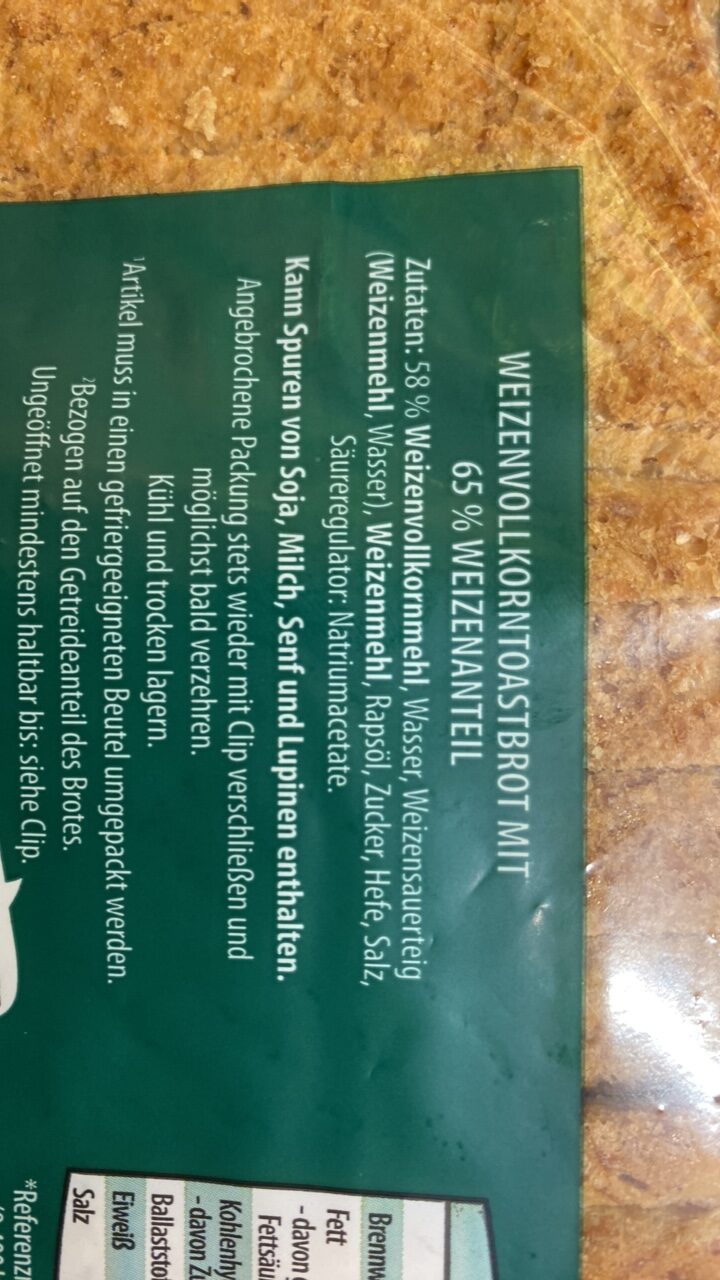
Barcode: 4061458045759
weizenvollkorntoastbrot mit
HALAL
📝 Reason: After checking each ingredient, there are no Haram or Doubtful (mashbooh) items such as pork, alcohol, or animal-derived ECodes. The preservatives, yeasts, and processing agents are all plant or mineral origin and listed as Halal by multiple Islamic food authorities. Therefore, this bread is Halal, according to general Islamic dietary law (Quran 5:3), and meets the ingredient compliance per IFANCA and food chemical additive guidelines.
🏷️ Category: Bread
📄 Certificates: Vegetarisch
Ingredients:
Details
Understanding the Halal Status of Weizenvollkorntoastbrot
When it comes to ensuring that our food choices are compliant with Islamic dietary laws, the Halal status of a product is of paramount importance. Weizenvollkorntoastbrot, a wholesome bread made from whole wheat, has been identified as Halal based on an extensive review of its ingredients. Let’s delve deeper into what makes this bread a suitable choice for those observing Halal.
Ingredients Breakdown
The ingredients of Weizenvollkorntoastbrot include:
- 58% Weizenvollkornmehl (whole wheat flour)
- Wasser (water)
- Weizensauerteig (wheat sourdough)
- Weizenmehl (wheat flour)
- Rapsöl (rapeseed oil)
- Zucker (sugar)
- Hefe (yeast)
- Salz (salt)
- Natriumacetate (sodium acetate)
Whole Wheat Flour
Whole wheat flour constitutes 58% of Weizenvollkorntoastbrot. It is derived from wheat, making it a plant-based ingredient. According to sources like Islamic Finder, there are no animal additives involved in its production. Therefore, it is Halal.
Water
Water is universally recognized as Halal. There are no sources of contamination in its natural state, thus maintaining its Halal integrity.
Wheat Sourdough
Weizensauerteig is produced from natural fermentation of wheat. While some sourdough processes may produce alcohol, all traces burn off during baking, ensuring that it remains Halal. As stated in My Halal Kitchen, this product is safe for consumption.
Wheat Flour
Weizenmehl (wheat flour) is yet another ingredient in Weizenvollkorntoastbrot that is entirely plant-based, thus reinforcing the product’s Halal status.
Rapeseed Oil
Rapsöl (rapeseed oil) is derived from a plant source, making it Halal. Sources such as Halal Food Foundation acknowledge that rapeseed oil is permissible in halal diets.
Sugar
Zucker (sugar) is generally Halal. However, concerns arise when it is processed using animal bone char, which is rare in Europe. Hence, it is safe to consider the sugar used in this product as Halal, with reassurance sourced from Halal Guide.
Yeast
Hefe (yeast) acts as a leavening agent that is derived from fungi—therefore, it is Halal. According to IFANCA, yeast does not pose any Halal issues.
Salt
Salz (salt) is mineral-based and always Halal. It brings flavor without compromising Halal standards.
Sodium Acetate
Natriumacetate, or sodium acetate (E262), is a permitted preservative that is Halal. It is compliant with standards set by various food authorities, as referenced on platforms like Halal Food Foundation.
Conclusion
After examining each ingredient in Weizenvollkorntoastbrot, no Haram or doubtful substances (mashbooh) such as pork derivatives or alcohol are found. The preservatives, yeasts, and processing agents are all recognized as Halal by numerous Islamic food authorities. According to the Quran (5:3) and scientific compliance with IFANCA and food chemical additive guidelines, we confidently affirm that Weizenvollkorntoastbrot is indeed Halal.
In conclusion, for those seeking a reliable bread option that adheres to Halal guidelines, Weizenvollkorntoastbrot serves as a commendable choice, combining health and compliance harmoniously.
